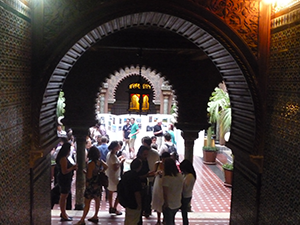Concept
It is certainly a commonplace to say that knowledge transfer is never neutral, occurring in specific conditions that interfere in whatever is being transferred, and between subjects formed and conditioned differently, which implies that meanings change while being "transferred". Nevertheless, working on global realities, and being confronted with relationships established diachronically as well as synchronically, we question the practices and the concepts that contribute to the way these transfers occur.
The second CHAM international conference, conceived as a starting point of a strategic project on "Frontiers", discussed "Knowledge transfer and cultural exchanges" from two perspectives, although not necessarily put apart.
A methodological and conceptual perspective aims at questioning practices and concepts associated to knowledge transfer: the concept of generation, the concept of network, the concept of learning, the concepts of reception and appropriation, the concepts of "alterity" and cultural areas (hence, cultural frontiers) among others.
A historical perspective aims at identifying and discussing specific situations of knowledge transfer, comprehending values, customs, narratives, or scientific knowledge, and taking place in specific institutional, social and cultural realities, including family, school, or whatever exchange space is concerned.
We invited scholars from all humanities and social science disciplines to submit panel proposals on the following themes:
- New directions in historiography
- The strength of traditions
- Identities, heritage and conflict
- Language, communication, and translation
- Making sense of the globe: space and territory
- Networks and cultural power
- Circulation and consumption of material and visual culture
- Nature, science and world views
- Generations
- Learning: formal and informal
- Obstacles and constraints to cultural transfer
- Frontiers: visible and invisible
- Culture and State
The Scientific Committee decided which proposals to accept based on: a) compliance with the subjects and b) on clarity, relevance, cohesion and academic accuracy.
Keynote speakers
Wednesday 15 July, 11:30-12:30, Sociedade de Geografia de Lisboa (nr Restauradores)
Giovanni Levi (Università Ca'Foscari - ltaly)
"Violence and resistance in cultural transmission"
This paper discusses the way cultural transmission depends on cultures, ideologies and resistances. Recent conflicts over the extension of GMO plantations have several examples in the past, concerning opium, tea, sugar, maize, potato, Coca Cola or Mc Donalds. These examples allow us to discuss the question of how transmission can be violent and how people can accept it or react.
Friday 17 July, 16:30-18:00, Auditorium 1, Tower B, Faculdade de Ciências Sociais e Humanas.
Philip Rothwell (Oxford University - UK)
"Cultural exchanges in the aftermath of Empire: re-readings and re-writings in the Portuguese-speaking world"
This talk examines cultural instances emerging from the former colonies of Portugal, one of Europe's longest-lasting empires, that interrogate Europe by refracting the continent's literary traditions and revealing the latent falsehoods of replicated "originals".
Organisation
Scientific committee
- Aliocha Maldavsky (U. Paris X - France)
- Giovanni Levi (Università Ca'Foscari - ltaly)
- Helena Carvalhão Buescu (FLU Lisboa - Portugal)
- Joao Luís Lisboa (CHAM)
- João Paulo Oliveira e Costa (CHAM)
- Júnia Ferreira Furtado (UFMG - Brazil)
- Kapil Raj (EHESS Paris - France)
- Manuel Herrero Sanchez (UPO - Spain)
- Márcia Abreu (Unieamp - Brazil)
- Mariagrazia Russo (Università della Tuscia - Italy)
- Olinda Kleiman (Université de Lille 3 - France)
- Philip Rothwell (Oxford University - UK)
- Teresa Cruz e Silva (U. E. Mondlane - Mozambique)
Executive committee
- Alice Santiago Faria
- Ana Maria Martinho Gale
- Cristina Brito
- João Luís Lisboa
- Nunziatella Alessandrini
- Paulo Teodoro de Matos
- Roberta Stumpf







